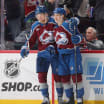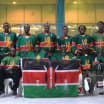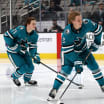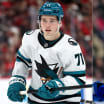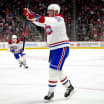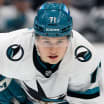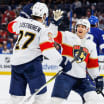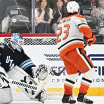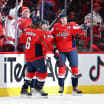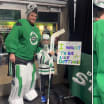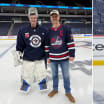TORONTO -- Rogie Vachon admits he's been a little embarrassed by the love that has washed over him since he found out in late June he would be inducted into the Hockey Hall of Fame.
Vachon had scores of teammates and made a great many friends playing 16 seasons from the 1960s into the 1980s, wearing the jerseys of the Montreal Canadiens, Los Angeles Kings, Detroit Red Wings and the Boston Bruins.
But Vachon has been especially gratified by the kind words coming his way in recent weeks from his goaltending lodge brothers, a tight fraternity that cares for its own.
Chico Resch credits Rogie Vachon for his success
Former Islanders goalie says studying Vachon gave him a game plan for his career
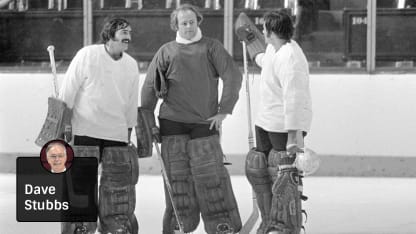
© Denis Brodeur/Getty Images
Four Hall of Fame goalies have been publicly effusive in their praise, two of whom played for the Canadiens.
Ken Dryden, whose arrival in Montreal late in the 1970-71 season would lead to Vachon's trade to the Kings that November, has spoken highly not just of his Vachon's skill and speed in the net, but of his strong qualities as a teammate during a difficult time as he was shuffled out of the No. 1 job.
Patrick Roy, who won two Stanley Cups in Montreal and two more with the Colorado Avalanche, regards Vachon as a role model, a goalie he saw live for the first time as an impressionable 8-year-old when the Kings played the Canadiens at the Montreal Forum. In turn, Vachon says it was Roy's hybrid style that would change the way the position was played.
Johnny Bower of the Toronto Maple Leafs, who most famously played against Vachon in the 1967 Stanley Cup Final, speaks warmly of facing an untried 21-year-old rookie in that series and having Vachon give the Maple Leafs all they could handle.
And Dominik Hasek, whose sprawling, loose-limbed style was terrible to look at but incredibly effective for the Chicago Blackhawks, Buffalo Sabres, Detroit Red Wings, Ottawa Senators and the 1998 Olympic-champion Czech Republic, has said he wants to meet Vachon at Monday's induction ceremony. Hasek simply wants to shake the hand of the little goalie who, on many nights, played like a brick wall as a member of three Canadiens Stanley Cup champions and was co-recipient of the 1967-68 Vézina Trophy with Gump Worsley.
"Hasek wants to meet me. How cool is that?" Vachon said.
In recent days, former goaltenders Darren Pang and Corey Hirsch have used their Twitter accounts to send their best wishes to Vachon, while the legendary goaltending pioneer Emile "The Cat" Francis sent his congratulations after having unsuccessfully tried to get Vachon elected on at least a couple of occasions when he was a member of the Hall of Fame selection committee.
And then there's Glenn "Chico" Resch, the terrific former New York Islanders goalie who is thrilled for Vachon.
Resch first came to know of Vachon in 1966-67 when he was playing goal in Regina, Saskatchewan, and Vachon was tending the Canadiens net.
"I was kind of a coward, wearing no mask, and I lost my front tooth," said Resch, who, at 5-foot-9, is two inches taller than Vachon. "Then I would look at the courage that Rogie showed. Most goalies in those days were at least a little afraid of the puck, which they'd tell you if they were honest. But here's Rogie, this little guy playing for the Canadiens, out there without a mask, diving into pileups, facing those shots."
Resch laughed. "And then there was his name: Rogatien Vachon. It was as magical as Georges Vézina."
Resch played major junior for the Regina Pats, the Canadiens' sponsorship of the team putting Pats players in the Montreal system with a single signature. Resch signed the C-Form of the day then headed to the University of Minnesota-Duluth for three seasons, from 1968-71.
It was in the fall of 1971, Dryden having stood the NHL on its ear with his stunning not-yet-rookie Stanley Cup-winning performance in the 1971 postseason that Resch arrived at the Canadiens training camp.
"From Duluth I go to the Canadiens camp realizing I never had much of a game plan," Resch said. "I had seen Rogie play on TV - with no cable, you got "Hockey Night in Canada" - and I saw tons of pictures. He was a cool-looking goalie, long hair and sideburns. I guess it was basically his size that I could identify with."
Resch arrived at the Forum by "divine intervention," in his words, dressing with about a half-dozen goaltenders ranging from good quality to Hall of Fame-bound.
"But I just wanted to see Rogie," said Resch, who also remembered first-year Canadiens coach Scotty Bowman wearing a stretchy track suit to run workouts. "Rogie never fit the bill of being your typical quirky goalie with that kind of reputation. He was always fun and respectful and friendly and encouraging.
"Something hit me at that camp. I said to myself, 'Glenn,' because I wasn't Chico yet, 'you're not that good. You've had an okay college career but you don't have a plan. So here's the new plan: You're going to watch Rogie Vachon every single minute you can.' "
With the camp split up into four scrimmage teams, Resch would either study Vachon at the other end of the rink or scope him from the stands. He also remembered sprinting across the street to a greasy spoon for the fried-egg sandwiches he'd bring back and eat in the Forum stands while he watched.
"I watched how Rogie stepped on the ice," Resch said. "I figured, 'I'm not an original so I have to be an imitator to make it. I've got to imitate someone who has made it, and Rogie has.' I watched him on the ice, on the bench, and I tiptoed around from the visitor's side, which is where our dressing room was, just to say hi to him. I watched him in the locker room, the way he conducted himself. I only lasted six days at that camp, but watching Rogie was etched forever in my memory."
Resch had a good camp, and when he was told to report to chief scout Claude Ruel's Forum office, he thought he was going there to sign a big-league contract. Instead, Ruel told him he was being sent to the Muskegon Mohawks of the International Hockey League.
Devastated, he cajoled the Canadiens into letting him stay in town to watch his first live NHL game, then report to the Mohawks.
He was usually last off the ice in Muskegon, for two reasons: "I wanted to work on all the moves that I could remember having seen Rogie make in camp, and I was terrified of being initiated by the other players."
On June 6, 1972, Resch was traded to the New York Islanders with fellow goalie Denis DeJordy in a multiplayer deal. It was Bob Turner, Resch's junior coach in Regina, who recommended him to Islanders general manager Bill Torrey, whom Turner had followed from the Oakland Seals to Long Island.
Resch's link to Vachon got better. It was against Vachon and the Kings that Resch earned his first NHL shutout, on Dec. 14, 1975, a 20-save home-ice effort. And he was the third goalie with Team Canada, behind Vachon and Gerry Cheevers, for the 1976 Canada Cup, a tournament that would be one of Vachon's finest hours.
"What I most remember about that experience were the little bottles of Coke in the Forum dressing room, grabbing one and running to the bus," Resch said. "The only seat left was beside (Team Canada and Canadiens GM) Sam Pollock, so I sat down, opened the shaken bottle and sprayed Sam completely with it."
On Saturday, Vachon recalled a game against Resch as perhaps the greatest in his own 795-game career, a 0-0 tie on Long Island on Oct 18, 1977. Vachon stopped 41 shots, Resch 28.
"I think they had about 2,000 shots that night," Vachon joked, and it might even have seemed that way. "It's probably my best-ever game. For the first time in my whole career, that night I saw a play develop from the other end to my net, and I saw the replay before it happened. That's how the concentration was at that time. Unfortunately, it never happened again, but it happened once. That's pretty impressive."
Resch would go on to win the 1980 Stanley Cup with the Islanders, playing 571 NHL games for the Islanders, Colorado Rockies, New Jersey Devils and Philadelphia Flyers. To this day, he has fond memories of studying Vachon's every move, many of them in Montreal while wolfing down greasy-spoon fried-egg sandwiches, and of appreciating them around the NHL for years after that.
"Rogie would be put in Los Angeles, on another part of the planet," Resch said. "In those days, out there, he wasn't recognized for being as good a goalie as he was.
"I'm just thrilled that he's going into the Hall of Fame. Little Rogie Vachon overachieved by using every ounce of his God-given talent, mentally, physically and emotionally, to get everything out of himself, and in the end to promote his team and the game."


